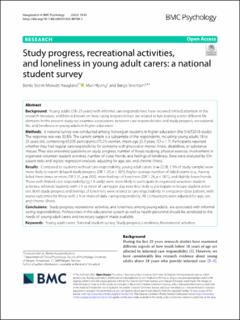Study progress, recreational activities, and loneliness in young adult carers: a national student survey
Journal article, Peer reviewed
Published version

Åpne
Permanent lenke
https://hdl.handle.net/11250/2994938Utgivelsesdato
2022-02-26Metadata
Vis full innførselSamlinger
Sammendrag
Background: Young adults (18–25 years) with informal care responsibilities have received limited attention in the research literature, and little is known on how caring responsibilities are related to functioning across different life domains. In the present study we examine associations between care responsibilities and study progress, recreational life, and loneliness in young adults in higher education.
Methods: A national survey was conducted among Norwegian students in higher education (the SHoT2018-study). The response rate was 30.8%. The current sample is a subsample of the respondents, including young adults 18 to 25 years old, comprising 40.205 participants (70.2% women, mean age 22.0 years, SD = 1.7). Participants reported whether they had regular care responsibility for someone with physical or mental illness, disabilities, or substance misuse. They also answered questions on study progress, number of hours studying, physical exercise, involvement in organized volunteer student activities, number of close friends, and feelings of loneliness. Data were analyzed by Chi-square tests and logistic regression analyses, adjusting for age, sex, and chronic illness.
Results: Compared to students without care responsibility, young adult carers (n = 2228, 5.5% of study sample) were more likely to report delayed study progress (OR 1.20, p < .001), higher average number of failed exams (e.g., having failed three times or more, OR 1.31, p = .002), more feelings of loneliness (OR 1.26, p < .001), and slightly fewer friends. Those with limited care responsibility (≤ 1 h daily) were more likely to participate in organized volunteer student activities, whereas students with 2 h or more of caring per day were less likely to participate in leisure student activities. Both study progress and feelings of loneliness were related to care responsibility in a response-dose pattern, with worse outcomes for those with 2 h or more of daily caring responsibility. All comparisons were adjusted for age, sex, and chronic illness.
Conclusions: Study progress, recreational activities, and loneliness among young adults are associated with informal caring responsibilities. Professionals in the educational system as well as health personnel should be sensitized to the needs of young adult carers and necessary support made available.
